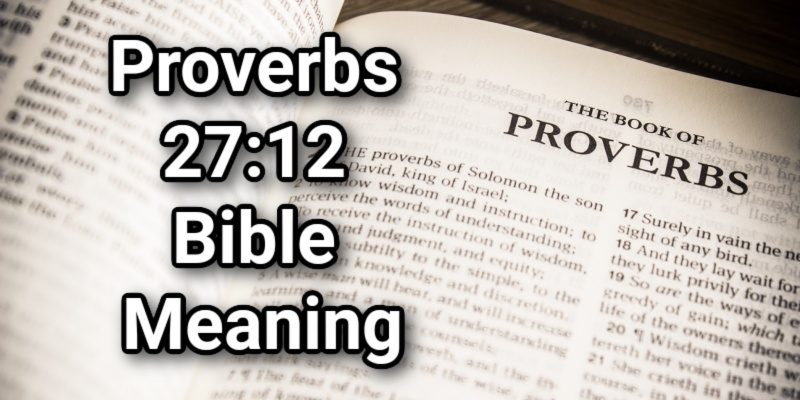Lord’s Library editors offer this short Proverbs 27:12 Bible verse meaning with commentary and supporting Scriptures.
Proverbs 27:12 states: “A prudent man foreseeth the evil, and hideth himself; but the simple pass on, and are punished.” This proverb offers insight on foresight, discernment, and the severe consequences of negligence. It emphasizes the virtue of prudence and the peril of simplicity in the face of foreseeable danger.
Proverbs 27:11, preceding our focal verse, says: “My son, be wise, and make my heart glad, that I may answer him that reproacheth me.” This sets a prelude to the counsel in verse 12 by emphasizing the value of wisdom not only for personal safety but also for the honor it brings to one’s family and mentors.
To unravel the depth of this verse, it’s essential to understand the key terms: “prudent” and “simple.” A prudent person is cautious and judicious in managing practical affairs. They anticipate potential dangers and take preventive measures to avoid harm. Conversely, the “simple” refers to those who are naive; lacking in wisdom and discernment, and therefore more likely to proceed without caution when the situation warrants it.
Prudent Man Foresees Evil Hides Himself Bible Verse Meaning
The core message of Proverbs 27:12 is the value of foresight in protecting oneself from foreseeable danger. These concepts of wisdom and foresight is a recurring theme in the book of Proverbs. For example, Proverbs 22:3 echoes this sentiment: “A prudent man foreseeth the evil, and hideth himself: but the simple pass on, and are punished,” virtually reiterating the message of 27:12. This cements Biblical advice on anticipating danger through wisdom.
Moreover, Proverbs encourages the acquisition of wisdom in 1:5: “A wise man will hear, and will increase learning; and a man of understanding shall attain unto wise counsels.” This verse complements Proverbs 27:12 by advocating for the pursuit of wisdom and understanding, which are imperative for both foreseeing and evading harm.
The contrast between the prudent and the simple is further explored in Proverbs 14:16: “A wise man feareth, and departeth from evil: but the fool rageth, and is confident.” This verse reinforces the idea that wisdom entails a healthy fear of danger and the sense to avoid it, whereas folly is characterized by overconfidence.
The New Testament echoes the Old Testament’s insight on prudence as well. In Matthew 10:16, Jesus advises: “Behold, I send you forth as sheep in the midst of wolves: be ye therefore wise as serpents, and harmless as doves.” This directive underscores the importance of being cautious in a world full of wicknedness while maintaining innocence and integrity.
Final Thoughts
Proverbs 27:12 underscores the Biblical principle that wisdom and foresight are indispensable qualities in navigating life’s challenges. It teaches that being prudent—seeing potential evil and taking action to avoid it—is essential for safeguarding oneself.
This message is echoed throughout the Scriptures, emphasizing that wisdom is not just about acquiring knowledge but also about applying that knowledge in a way that helps to avert obvious danger. Thus, the verse serves as a reminder of the importance of caution and discernment in the face of uncertainty.
Lord's Library is a Christian resource hub. Our editors use a variety of internet research methods like search engines, audio and video, AI, consultations with ministry leaders in the field, and more. Lord's Library should never be a substitute for reading your Bible daily as the Scriptures are to be our final authority on all matters. Lord's Library participates in affiliate programs. We may make a small commission from products purchased through this resource.
- What Does the Bible Say About Achievements? With Key Scriptures - April 11, 2025
- What does the Bible Say About Abortion? With Key Scriptures - April 11, 2025
- Prosperity Gospel Meaning in the Scriptures: Is it Biblical? - April 7, 2025















